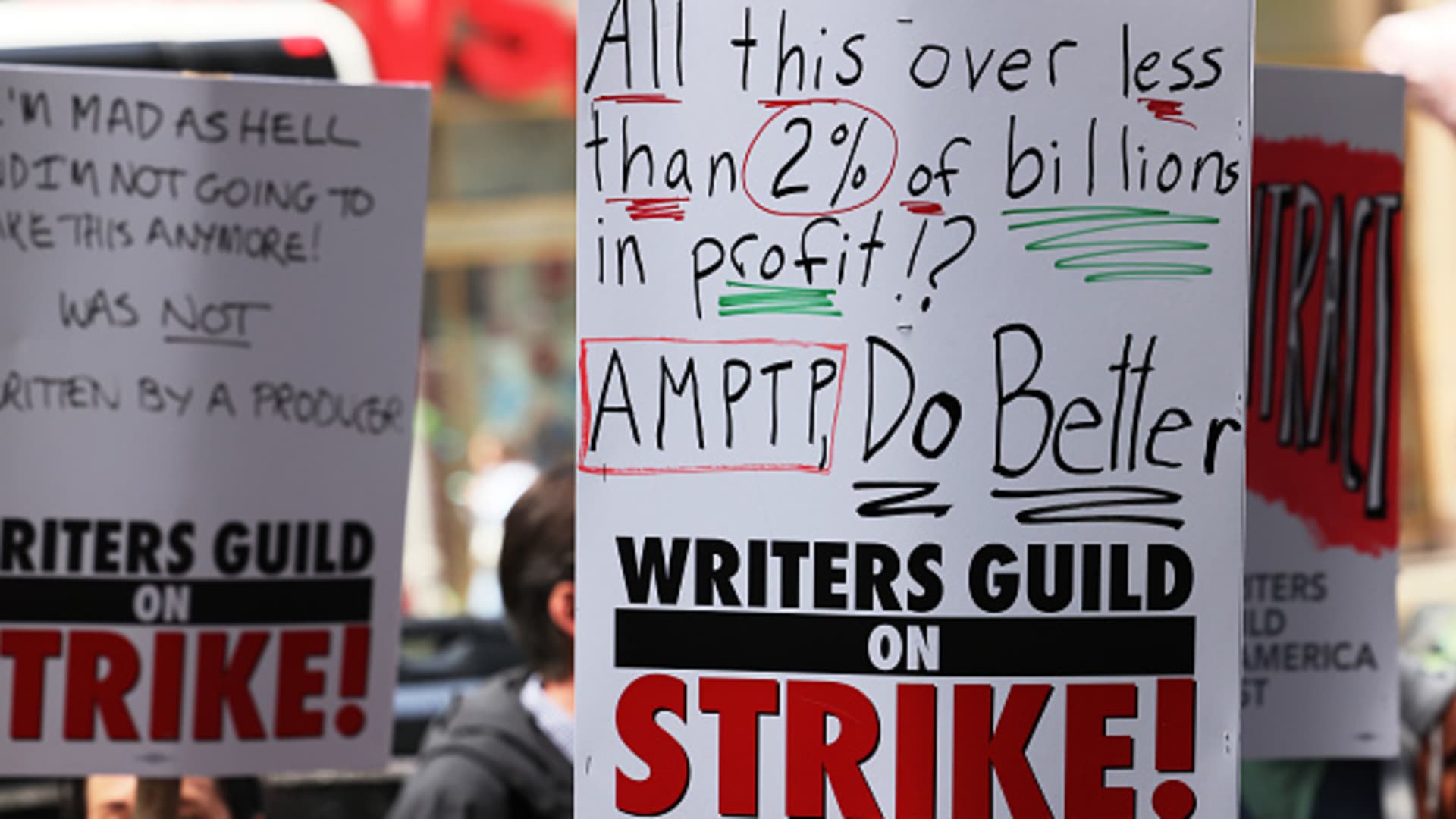
[ad_1]
Members of the Writers Guild of America (WGA) East hold signs as they walk on the picket-line outside of the Peacock NewFront on May 02, 2023 in New York City.
Michael M. Santiago | Getty Images
The Writers Guild of America dropped their pencils and headed for the picket lines a week ago, and their walkout is already hurting Hollywood productions.
More than 11,000 film and television writers, who say their compensation doesn’t match the revenue generated in the streaming era, are on strike for the first time since 2008. Immediately, daily late-night shows went dark, alongside the weekly comedy staple “Saturday Night Live.”
Since then, a number of notable films and shows have halted or wrapped production early, including Netflix’s “Stanger Things,” Disney and Marvel’s “Blade,” AppleTV+’s “Severance” and Paramount’s “Evil.”
Beyond the delayed production, and likely delayed releases, of these titles, industry experts worry the work pause could have a financial toll greater than that of the previous writers’ strike.
Writers who manned the picket lines 15 years ago remained on strike for 100 days, leading to an estimated cost of $2 billion to the industry, according to data from the Milken Institute. It also had major economic repercussions for ancillary businesses like hotels, restaurants and construction companies that often work with film and television productions.
This is the first strike of its kind during the streaming era and hits many companies across three different facets of their media businesses: theatrical, linear TV and streaming.
The WGA is seeking higher compensation and residuals, particularly when it comes to streaming shows, as well as new rules that will require studios to staff television shows with a certain number of writers for a specific period. The guild also is seeking compensation throughout the process of pre-production, production and post-production. Currently, writers are often expected to provide revisions or craft new material without being paid.
A number of productions with finished scripts, like Amazon’s “The Rings of Power,” have decided to continue filming without writers or showrunners on set. Others have opted to postpone production.
On Monday, Apple’s drama series “Severance” paused production of its second season after members of the International Alliance of Theatrical Stage Employees (IATSE) and Teamsters refused to cross the WGA picket line at York Studios in New York.
This is the second Apple series to shut down because of the strike, after Maya Rudolph’s series “Loot” paused filming last week in L.A.
Over the weekend, “Stranger Things” creators Matt and Ross Duffer announced that production on the fifth and final season of the show had been delayed because of the labor unrest.
“Writing does not stop when filming begins,” the duo tweeted. “While we’re excited to start production with our amazing cast and crew, it is not possible during this strike. We hope a fair deal is reached soon so we can all get back to work.”
Paramount’s “Evil” wrapped filming on season four earlier than anticipated, in part because of disruptions from picketing WGA members and, in part, because one of its cast members is taking a leave of absence due to a family matter. The season was slated to have 10 episodes, but it remains unclear whether the early end to production will impact those plans.
Warner Bros. Discovery’s streaming show “Hacks,” Showtime’s “Billions” and Starz’ “The Venery of Samantha Bird” all stopped production.
On the theatrical front, Marvel has shut down production on its vampire thriller “Blade.” The film was set to begin shooting next month in Atlanta. Nic Pizzolatto, creator of “True Detective,” was recently tapped to work on the script, but did not finish. Production is expected to restart once the strike is over.
Ripple effects
The strike is already having ripple effects across the industry as stars and talent stand in solidarity with writers.
Drew Barrymore stepped away from her role as host of the MTV Movie Awards as a show of support for the WGA. Several presenters, including Jamie Lee Curtis, also indicated that they would not attend the ceremony. The show ultimately canceled its live broadcast and aired a taped version of the event Sunday night.
At-home viewers may not notice the strike’s impact right away, as episodes of popular shows continue to be released. However, future seasons could see significant delays or a shortened number of episodes.
The writers for ABC’s “Abbott Elementary” were supposed to convene on May 2 to begin work on season three of the popular comedy show. However, that room is closed for the strike.
Similarly, the writers room for Showtime’s “Yellowjackets” only met for one day to work on season three before breaking for the strike. At Warner Bros. Discovery, the “Game of Thrones” prequel “A Knight Of The Seven Kingdoms: The Hedge Knight” also closed its writers room for the duration of the strike.
Netflix’s “Big Mouth” was six weeks into writing its eighth and final season, but paused due to the labor dispute. The streamer’s hit “Cobra Kai” also saw its season six writers room shutter.
The longer the strike continues, the more productions are expected to be impacted.
“A protracted strike is a definite possibility,” wrote Doug Creutz, analyst at TD Cowen, in a research note published Friday. He defined protracted as more than three months.
“Clearly, a significantly extended strike would impact the amount of new shows available to streaming services and linear networks, which eventually could start to drive up both SVOD churn and linear cord-cutting,” he said.
[ad_2]





